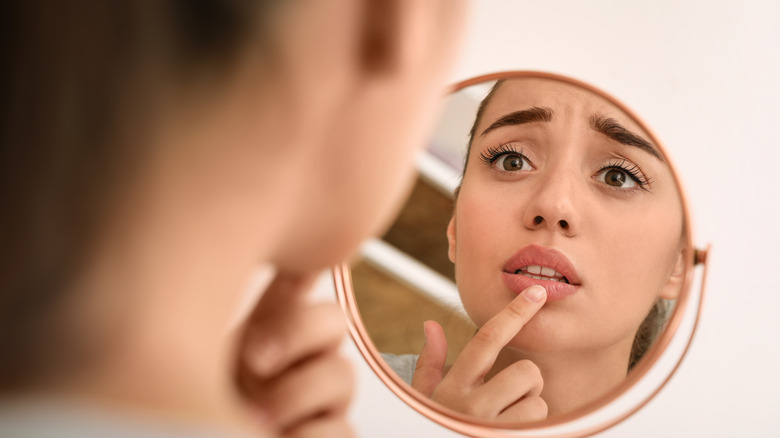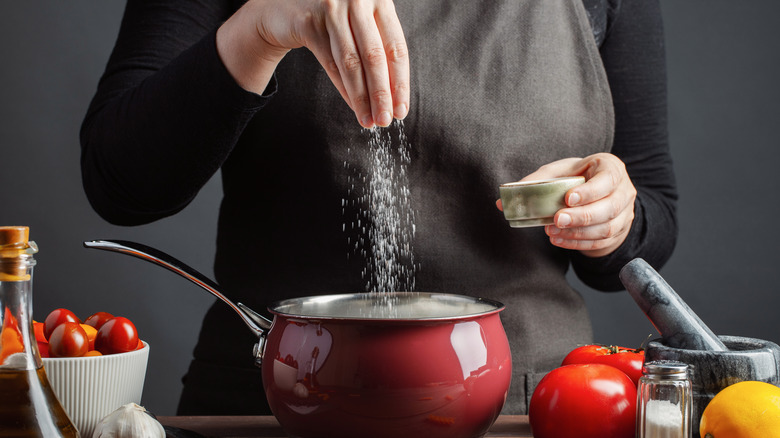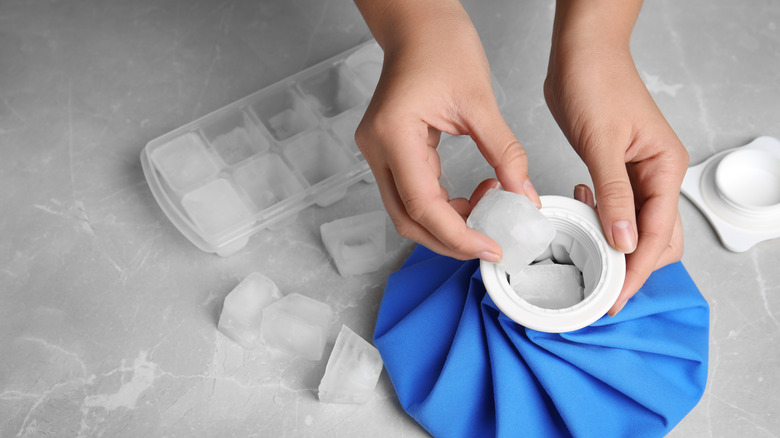Here's Why Salty Foods Might Give You Swollen Lips
Despite what you might hear through the food and nutrition grapevine, salt has its benefits. The mineral, which is made up of 60 percent chloride and 40 percent sodium, is known to "conduct nerve impulses, contract and relax muscles, and maintain the proper balance of water and minerals" in the human body, according to Harvard's School of Public Health. However, these things are only true if an appropriate amount of sodium is consumed each day. What's an "appropriate" amount, you ask? As it turns out, the average person consumes an estimated 3,400 mg of sodium per day, which is well over the recommended daily intake of 2,300 mg, per the U.S. Food and Drug Administration (FDA).
But, that doesn't mean you should push the boundaries when it comes to your health. High-sodium diets can lead to serious issues, including high blood pressure, heart disease, and even strokes. Perhaps less severe, but nonetheless alarming, salty foods can also impact your physical appearance, as well. Ever heard of "allergy face?"
Here's why salty foods might have you temporarily looking like a Kardashian.
Salt isn't your best friend
If you've ever munched on a bowl of chips or popcorn before bed, then you may be familiar with the less-than-ideal post-snack morning puff otherwise known as "allergy face." Speaking with Medical News Today, Dr. Jerry Bailey, a certified nutritionist, explained that an influx in salt consumption "causes the body to retain fluid, which may also cause swelling in the eyelids and the lips." This swollen facial complex is often described as "allergy face" because a person's facial features will closely resemble those of someone who may be experiencing an allergic food reaction. While it can be a bit off-putting and alarming, Dr. Bailey assures it is quite common, especially when an excessive amount of salt is consumed before bed.
Stephanie Klein, a registered dietitian and licensed nutritionist, also told Medical News Today that the retention of fluid sometimes occurs when there isn't an equilibrium of water and sodium in the bloodstream.
Fortunately, there are many ways to manage and treat swollen lips and puffy eyelids at home — though, if you believe you are actually having an allergic reaction (often accompanied by wheezing or shortness of breath) it's best to seek medical help immediately.
Treatment options for swollen lips
While swollen lips and puffy eyelids may not be the most beautiful thing to wake up to in the morning, experts assure both can be treated with over-the-counter (OTC) medication, as well as with a variety of at-home remedies. Let's start with swollen lips.
According to Healthline, targeting inflammation in the lips, which is what is causing the puffiness or "allergy face," is key and can be relieved one of two ways. The first way is with OTC medications known as nonsteroidal anti-inflammatory drugs (NSAIDs) like ibuprofen or Advil. It's important to note that Tylenol, aka acetaminophen, is not an NSAID; it treats fevers, headaches, and aches and pains, not inflammation (via MedlinePlus). Additionally, swollen lips can be relieved through ice treatment. Simply apply an ice pack (a frozen water bottle works, too) to the lips. Be sure to wrap the ice applicator in a dish towel to avoid pain or additional irritation.
A cold compress, almond oil massage, potato juice masks, cold tea bags (preferably rosemary tea), and turmeric and pineapple paste are ways you can combat puffy eyes at home without a doctor's help, per Vogue India. You can also try a lymphatic drainage massage, eye exercises, or facial yoga, a dermatologist told the outlet. Similarly to swollen lips, you can also take NSAIDs.
Additionally, If you are going to consume saltier foods, try eating them earlier in the day rather than at night. Alternatively, try low-sodium or unsalted versions of your favorite snacks (via Medical News Today).


